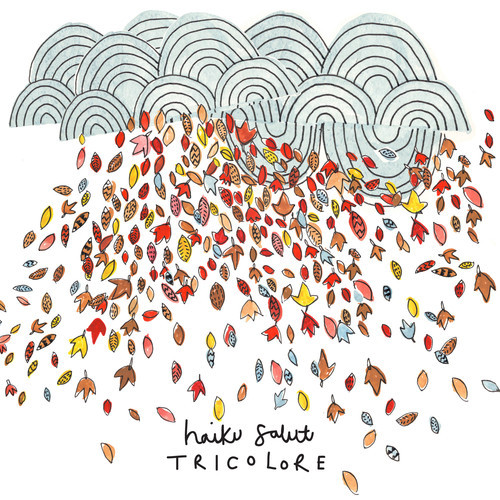One of the most appealing aspects of art is that it doesn’t require you to know the language to enjoy it. Most people probably can’t identify the key or time signature to Beethoven’s “Moonlight Sonata,” or be able to comprehend and appreciate Van Gogh’s brushstroke technique, but that doesn’t mean people can’t be enamoured by it. In music we attach ourselves to melodies, chords, and lyrics that speak to us as an individual, which open up new worlds, or reveal past memories.
Thus I admire and have a great fondness for musicians whose work is solely instrumental. There’s something romantic about trying to communicate (or create) an idea through notes alone, not relying on actual words to get your point across. If anything, words can complicate the work, acting as a distraction, like someone talking over another person if not quite literally putting words or ideas in your head, allowing personal interpretation to slip out of the picture. Kudos then to Haiku Salut, a three-piece from Derbyshire in the UK who don’t bother with lyrics of any sort on account of “[having nothing] of interest to say.” Their music fuses together classical elements with non-classical styles and instruments, all married to amusingly long, silly song titles. There’s plenty to interpret musically, but on their debut album Tricolore, there doesn’t feel like there’s much actually being said across the twelve tracks.
The album consists of two halves related in the instruments they share, but separate in their tone. The first half leans more towards the playful side of the trio’s personalities, melding together plenty of tiny riffs and motifs, and fusing them together to create bigger wholes. “ll: Lonesome George (Or Well, There’s No-one Like) :ll” marries flamenco guitar flicks, militaristic drumming, and children’s show theme music xylophone. It all snuggles together nicely but after ninety seconds it’s done all it needs to do and spends another minute and half exhaling and trying to find a pleasing cadence to finish on. “Leaf Stricken” puts prepared piano and guitar beside each other before washing the whole thing over with jittery, watery electronics while “Watanabe” sounds like the three of them sitting at piano together, each playing a section of the keyboard. They’re charming in passing, sure, but they aren’t expressly interesting moments that entice you back again and again. “Watanabe” is odd moment in particular in that it should work better than it does. The track is recorded in a way that lets you hear the keys being hit as well as well as the notes themselves, but despite the sonic detail, there’s still a human element missing. I dare say there’s something robotic about it at times, like a player piano tinkering away in an empty room at its own accord.
After a brief interlude, the album starts hitting the mark better on its B side. Here they sound more formal and focused, and while that might make me sound like a scrooge for not liking the fun elements of their tracks (because I do, but to an extent), their music benefits from sounding like it has purpose and direction. “Six Impossible Things” drifts along with acoustic guitar at first, like a raft on a peaceful sea, but before long it’s bobbing along pleasantly, hitting on a sound of triumph with its horns and accordion working together wonderfully. “Glokelbar” has plenty of sparkling percussion instruments along with a semi-aggressive IDM beat running through it. It could again be accused of not saying much, but its sense of movement is enjoyable to be whisked away by. The same could be said for “Train Tracks For Wheezy”, albeit capturing a more ambling pace that soon opens up into a wonderfully unexpected string section that paints a delightfully detailed picture of a steam engine chugging across a cinematic landscape (granted it’s an image that’s encouraged due to the song’s title, but it’s still a pleasing image to take in).
Though they drop the classical genre when describing themselves (“classical music for the unclassically trained of hearing”), there’s plenty of other bands and artists outside that realm that Haiku Salut owe a nod to: the horns here recalls Zach Condon’s arrangements and the piano on “Los Elefantes” seems directly inspired by Yann Tiersen. Although all this mention of accordions and piano might bring to mind A Hack And A Hacksaw, there’s a separation from that duo in that they seem rooted in styles indebted to Northern Europe or North America as opposed to Eastern regions. It’s Iceland’s múm that keep coming to mind when listening to Tricolore. All the chirping electronics, melodicas and moments of childishness bring the comparison to focus, and though Haiku Salut stray away from elfish qualities (thankfully), they can still start a track or introduce an electronic or acoustic element that will make me think I’m listening to múm’s Early Birds instead.
Haiku Salut might struggle here to say something with their instruments and soundscapes, but they can still evoke ideas. Some tracks move in unexpected ways (the wandering tinkling of “Watanabe,” the strange and beguiling sudden shift into a full on dance beat on final track “No, You Say It”), which makes it hard to know what to latch onto, while others move in predictable manners that come to be something of a temporary pleasure (“Los Elefantes”). Tricolore is enjoyable, but it’s a sum of two different parts; together it comes off as strangely disjointed, like shifting from speaking German to speaking Japanese. But in separate eighteen minute segments it works better, more specifically the latter half. It begins to sound like the trio have caught onto a relatable language and have some idea about what they want to say.

